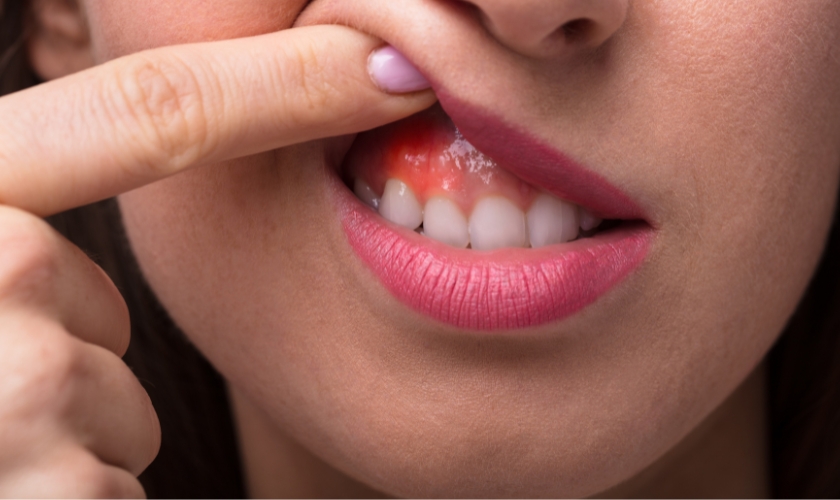Top Family, Cosmetic and Implant Center In 537 Amherst St, Nashua, NH 03063
What Is The Best Thing To Do For Gum Disease?

Our gum health is an often-overlooked protagonist in the complicated tapestry of our well-being. Gum disease is a silent but strong menace that reaches beyond the borders of our lips. Consider our teeth to be sentinels, and our gums to be the sturdy walls of a castle. This tutorial reveals strategies for strengthening these defenses. We go on a quest to combat gum disease, beginning with the silent invader, plaque, and ending with the sophisticated methods of dental warriors. Join us as we crack the secret to bright smiles and long-lasting oral resilience, allowing you to protect an important element of your overall health.
Understanding Gum Disease:
Periodontal disease, often known as gum disease, is an inflammatory disorder that affects the tissues around teeth. It all starts with the buildup of plaque, a sticky coating of germs on the teeth and gums. When plaque hardens into tartar, it provides a breeding ground for bacteria, causing irritation and eventually gum damage. Periodontal disease is an infection of the tissues that keep teeth in place and is frequently caused by inadequate brushing and flossing practices. The symptoms begin with swollen, red, and bleeding gums. While rarely fatal, untreated periodontal disease can cause major health problems. In adults, the condition leads to gum separation from the teeth, resulting in pockets of bacteria that damage gum tissue and bone, eventually leading to tooth loss.
Best Practices For Managing Gum Disease:
Regular Brushing And Flossing:
Brush teeth twice daily with fluoride toothpaste to eliminate plaque, and floss daily to clean between teeth and along the gumline to maintain optimal gum health. This aids in the prevention of plaque accumulation and improves overall dental hygiene.
Professional Dental Cleanings:
Regular dental exams are essential for maintaining good oral health and cleanliness. Dentists are a crucial tool for maintaining excellent oral health because they can remove tartar, identify early indications of gum disease, and provide personalized guidance.
Antimicrobial Mouth Rinses:
Use antimicrobial or antiseptic mouth rinses to minimize oral microorganisms. Consult a dentist for appropriate dental health products. Include these rinses in your regimen to improve dental hygiene and prevent gum disease, thus improving your overall oral health.
Quitting Smoking:
Quitting smoking is essential for controlling and avoiding gum problems, as well as boosting general dental health. It lowers the risk of gum disease while also hastening recovery and improving resilience and well-being. Quitting smoking is a big step towards better oral health.
Adhering to these practices fosters a proactive approach to gum health, significantly reducing the risk of gum disease and contributing to a resilient oral environment.
Some Natural Remedies For Gum Diseases:
Dental specialists are vital for treating infections and managing gum disease. Natural solutions for loose teeth and gum disease, on the other hand, can help preserve general health. Natural cures for gum disease include green tea, hydrogen peroxide, aloe vera, turmeric paste, sage mouthwash, salt water, lemongrass oil, baking soda, and coconut oil. Green tea contains anti-inflammatory antioxidants, while hydrogen peroxide is a mild antiseptic.
Aloe vera has been demonstrated to minimize gingival bleeding and possesses anti-plaque and anti-gingivitis effects. Sage mouthwash, which may be produced at home, helps soothe irritated gums. Salt water is a natural disinfectant that can kill germs and aid in the healing of injured mouth tissue. Lemongrass oil has the ability to reduce bacterial plaque and neutralize acids that cause irritation and tooth damage. There is minimal evidence that coconut oil can aid with gum disease.
Nutrition For Gum Health:
There has been little research on the relationship between certain nutrients and gum health. Some nutrients, on the other hand, may be beneficial to gum health. Vitamin C, which is found in citrus fruits, berries, and leafy greens, has been shown to lower gum inflammation. Vitamin B12, which is found in animal products such as milk, eggs, and meat, may help with gum health. B12 deficiency has been related to severe gum disease. A diet high in omega-3 fatty acids, such as flaxseed oil and seafood, may also aid in the regulation of gum tissue inflammation. These nutrients are critical for gum health and reducing gum bleeding. The investigation is underway.
Professional Treatments:
When preventative measures fail, getting expert assistance becomes critical. Depending on the severity of the gum disease, dentists will use a variety of therapies to tackle it. Scaling and root planing is a non-surgical technique that eliminates plaque and tartar from below the gumline. In more severe situations, surgical procedures such as flap surgery and bone transplants may be required to replace damaged tissues and avoid future degeneration.
The Role of Good Habits:
Gum health may be greatly improved by developing excellent habits outside of the dentist’s chair. Tobacco products should be avoided at all costs, since smoking has been linked to an increased risk of gum disease. Additionally, stress management strategies such as meditation and exercise can have a favorable influence on oral health, as stress has been linked to an increased susceptibility to gum disease.
As we continue our examination of optimal gum health, keep in mind that the road to a robust smile is built with constant care. Every step, from meticulous daily routines to professional interventions, strengthens your mouth defenses. Accept frequent check-ups, prioritize prevention, and break bad habits like smoking. Allow your commitment to gum health to be a reflection of your devotion to overall well-being. With each brushstroke, flossing strand, and decision to quit smoking, you build not just a beautiful smile but also a solid foundation for long-term dental health. Empower yourself by adopting these measures and relishing the success of a healthy, vivid smile.

